Case Study Analysis: Ethical and Legal Issues in Taylah's Case
VerifiedAdded on 2022/11/16
|11
|3199
|263
Case Study
AI Summary
This case study analyzes the ethical and legal complexities surrounding Taylah, a 14-year-old seeking contraceptives. The assignment delves into the application of ethical principles such as autonomy, beneficence, non-maleficence, and justice in the context of Taylah's healthcare. It explores the legal considerations regarding consent for healthcare services for minors, particularly in the context of Taylah's situation and her state's laws. The case study highlights the responsibilities of nursing professionals in providing ethical and patient-centered care, including respecting patient autonomy, providing comprehensive health education, and addressing potential health risks associated with Taylah's lifestyle and medical history. The analysis emphasizes the importance of balancing patient rights, legal requirements, and the promotion of overall well-being to ensure high-quality healthcare delivery. Furthermore, it examines the role of motivational interviewing and other strategies to encourage healthy lifestyle choices and improve health literacy. The case study also addresses potential drug-disorder interactions related to Taylah's health conditions. The assignment aims to provide insights into the ethical and legal frameworks that guide healthcare professionals in providing optimal care to adolescent patients.
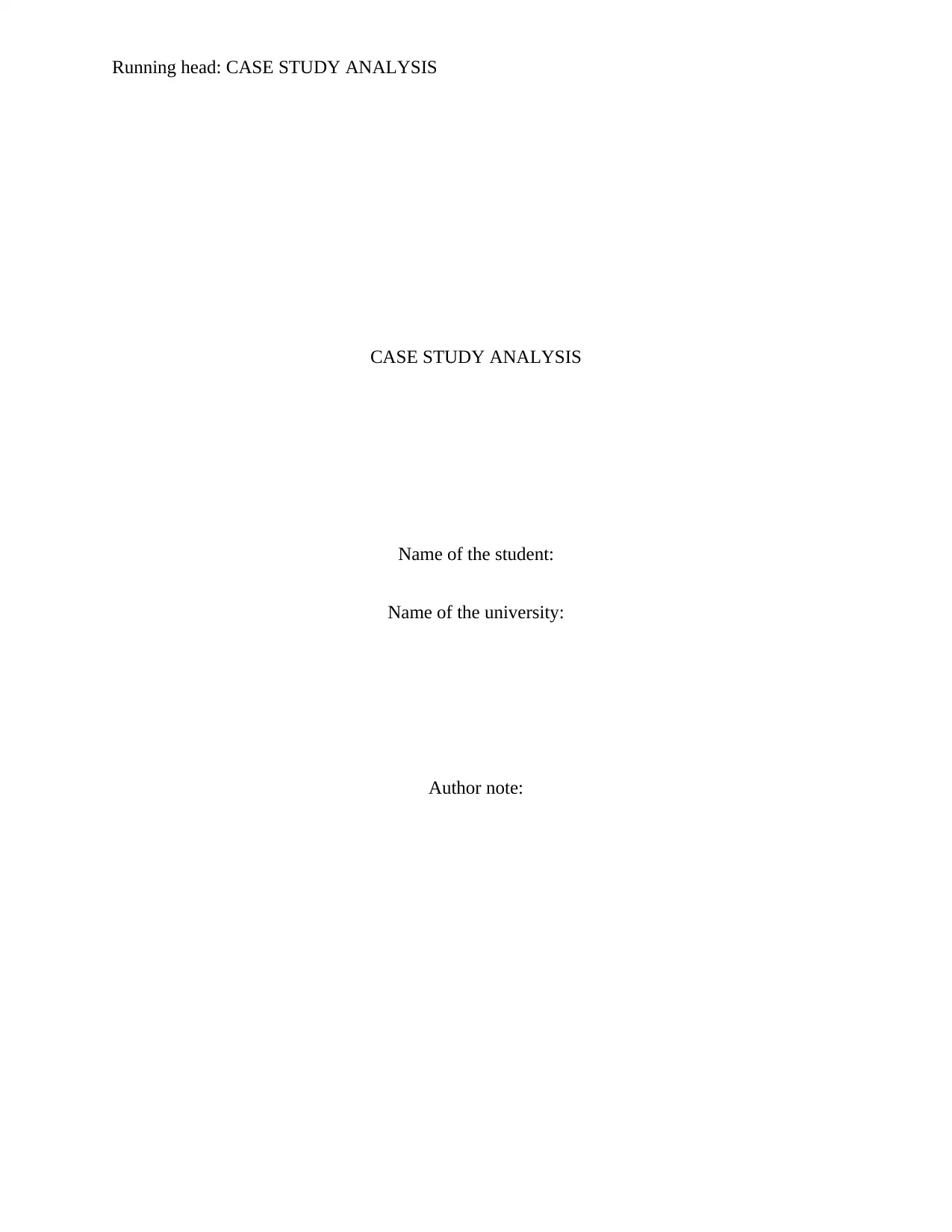
Running head: CASE STUDY ANALYSIS
CASE STUDY ANALYSIS
Name of the student:
Name of the university:
Author note:
CASE STUDY ANALYSIS
Name of the student:
Name of the university:
Author note:
Paraphrase This Document
Need a fresh take? Get an instant paraphrase of this document with our AI Paraphraser
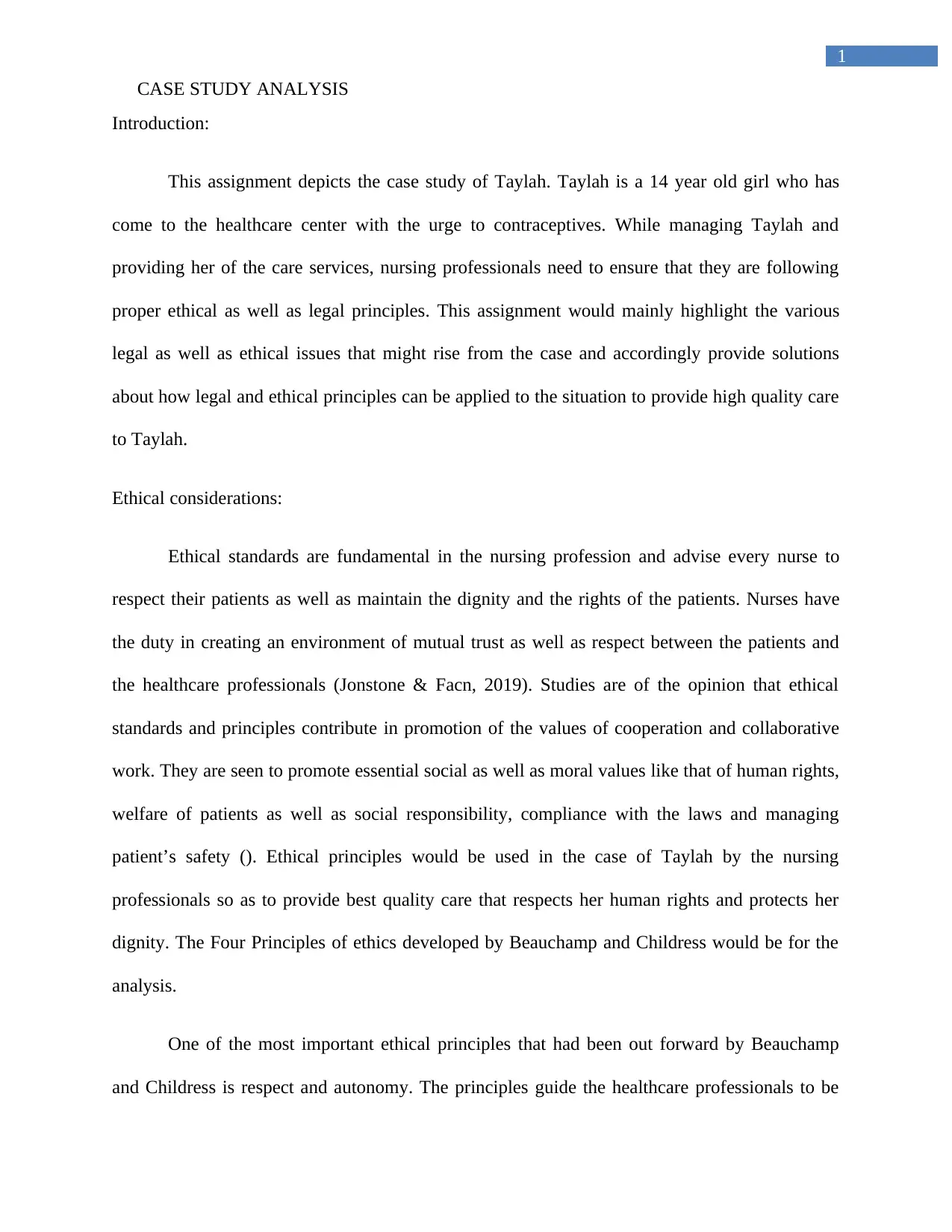
1
CASE STUDY ANALYSIS
Introduction:
This assignment depicts the case study of Taylah. Taylah is a 14 year old girl who has
come to the healthcare center with the urge to contraceptives. While managing Taylah and
providing her of the care services, nursing professionals need to ensure that they are following
proper ethical as well as legal principles. This assignment would mainly highlight the various
legal as well as ethical issues that might rise from the case and accordingly provide solutions
about how legal and ethical principles can be applied to the situation to provide high quality care
to Taylah.
Ethical considerations:
Ethical standards are fundamental in the nursing profession and advise every nurse to
respect their patients as well as maintain the dignity and the rights of the patients. Nurses have
the duty in creating an environment of mutual trust as well as respect between the patients and
the healthcare professionals (Jonstone & Facn, 2019). Studies are of the opinion that ethical
standards and principles contribute in promotion of the values of cooperation and collaborative
work. They are seen to promote essential social as well as moral values like that of human rights,
welfare of patients as well as social responsibility, compliance with the laws and managing
patient’s safety (). Ethical principles would be used in the case of Taylah by the nursing
professionals so as to provide best quality care that respects her human rights and protects her
dignity. The Four Principles of ethics developed by Beauchamp and Childress would be for the
analysis.
One of the most important ethical principles that had been out forward by Beauchamp
and Childress is respect and autonomy. The principles guide the healthcare professionals to be
CASE STUDY ANALYSIS
Introduction:
This assignment depicts the case study of Taylah. Taylah is a 14 year old girl who has
come to the healthcare center with the urge to contraceptives. While managing Taylah and
providing her of the care services, nursing professionals need to ensure that they are following
proper ethical as well as legal principles. This assignment would mainly highlight the various
legal as well as ethical issues that might rise from the case and accordingly provide solutions
about how legal and ethical principles can be applied to the situation to provide high quality care
to Taylah.
Ethical considerations:
Ethical standards are fundamental in the nursing profession and advise every nurse to
respect their patients as well as maintain the dignity and the rights of the patients. Nurses have
the duty in creating an environment of mutual trust as well as respect between the patients and
the healthcare professionals (Jonstone & Facn, 2019). Studies are of the opinion that ethical
standards and principles contribute in promotion of the values of cooperation and collaborative
work. They are seen to promote essential social as well as moral values like that of human rights,
welfare of patients as well as social responsibility, compliance with the laws and managing
patient’s safety (). Ethical principles would be used in the case of Taylah by the nursing
professionals so as to provide best quality care that respects her human rights and protects her
dignity. The Four Principles of ethics developed by Beauchamp and Childress would be for the
analysis.
One of the most important ethical principles that had been out forward by Beauchamp
and Childress is respect and autonomy. The principles guide the healthcare professionals to be
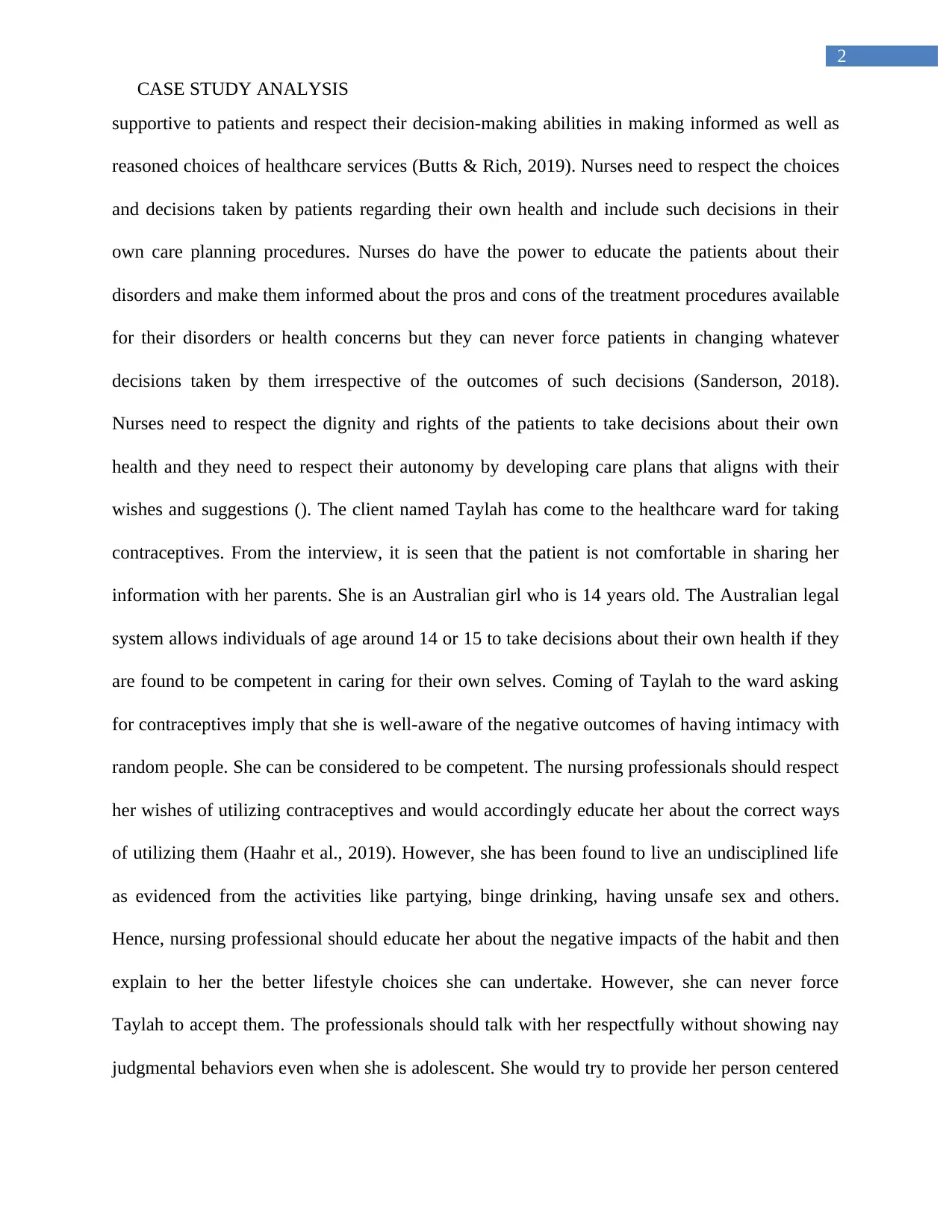
2
CASE STUDY ANALYSIS
supportive to patients and respect their decision-making abilities in making informed as well as
reasoned choices of healthcare services (Butts & Rich, 2019). Nurses need to respect the choices
and decisions taken by patients regarding their own health and include such decisions in their
own care planning procedures. Nurses do have the power to educate the patients about their
disorders and make them informed about the pros and cons of the treatment procedures available
for their disorders or health concerns but they can never force patients in changing whatever
decisions taken by them irrespective of the outcomes of such decisions (Sanderson, 2018).
Nurses need to respect the dignity and rights of the patients to take decisions about their own
health and they need to respect their autonomy by developing care plans that aligns with their
wishes and suggestions (). The client named Taylah has come to the healthcare ward for taking
contraceptives. From the interview, it is seen that the patient is not comfortable in sharing her
information with her parents. She is an Australian girl who is 14 years old. The Australian legal
system allows individuals of age around 14 or 15 to take decisions about their own health if they
are found to be competent in caring for their own selves. Coming of Taylah to the ward asking
for contraceptives imply that she is well-aware of the negative outcomes of having intimacy with
random people. She can be considered to be competent. The nursing professionals should respect
her wishes of utilizing contraceptives and would accordingly educate her about the correct ways
of utilizing them (Haahr et al., 2019). However, she has been found to live an undisciplined life
as evidenced from the activities like partying, binge drinking, having unsafe sex and others.
Hence, nursing professional should educate her about the negative impacts of the habit and then
explain to her the better lifestyle choices she can undertake. However, she can never force
Taylah to accept them. The professionals should talk with her respectfully without showing nay
judgmental behaviors even when she is adolescent. She would try to provide her person centered
CASE STUDY ANALYSIS
supportive to patients and respect their decision-making abilities in making informed as well as
reasoned choices of healthcare services (Butts & Rich, 2019). Nurses need to respect the choices
and decisions taken by patients regarding their own health and include such decisions in their
own care planning procedures. Nurses do have the power to educate the patients about their
disorders and make them informed about the pros and cons of the treatment procedures available
for their disorders or health concerns but they can never force patients in changing whatever
decisions taken by them irrespective of the outcomes of such decisions (Sanderson, 2018).
Nurses need to respect the dignity and rights of the patients to take decisions about their own
health and they need to respect their autonomy by developing care plans that aligns with their
wishes and suggestions (). The client named Taylah has come to the healthcare ward for taking
contraceptives. From the interview, it is seen that the patient is not comfortable in sharing her
information with her parents. She is an Australian girl who is 14 years old. The Australian legal
system allows individuals of age around 14 or 15 to take decisions about their own health if they
are found to be competent in caring for their own selves. Coming of Taylah to the ward asking
for contraceptives imply that she is well-aware of the negative outcomes of having intimacy with
random people. She can be considered to be competent. The nursing professionals should respect
her wishes of utilizing contraceptives and would accordingly educate her about the correct ways
of utilizing them (Haahr et al., 2019). However, she has been found to live an undisciplined life
as evidenced from the activities like partying, binge drinking, having unsafe sex and others.
Hence, nursing professional should educate her about the negative impacts of the habit and then
explain to her the better lifestyle choices she can undertake. However, she can never force
Taylah to accept them. The professionals should talk with her respectfully without showing nay
judgmental behaviors even when she is adolescent. She would try to provide her person centered
⊘ This is a preview!⊘
Do you want full access?
Subscribe today to unlock all pages.

Trusted by 1+ million students worldwide
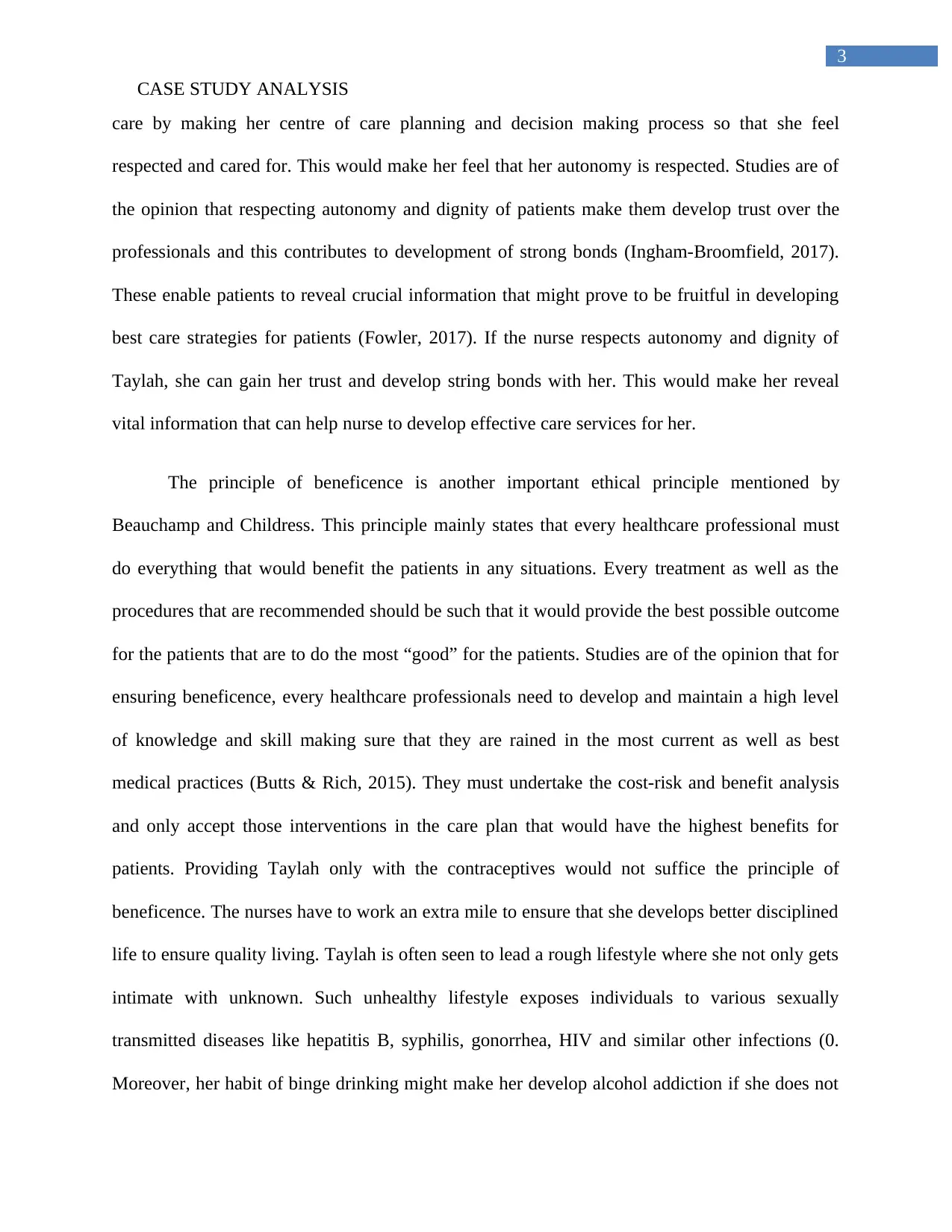
3
CASE STUDY ANALYSIS
care by making her centre of care planning and decision making process so that she feel
respected and cared for. This would make her feel that her autonomy is respected. Studies are of
the opinion that respecting autonomy and dignity of patients make them develop trust over the
professionals and this contributes to development of strong bonds (Ingham-Broomfield, 2017).
These enable patients to reveal crucial information that might prove to be fruitful in developing
best care strategies for patients (Fowler, 2017). If the nurse respects autonomy and dignity of
Taylah, she can gain her trust and develop string bonds with her. This would make her reveal
vital information that can help nurse to develop effective care services for her.
The principle of beneficence is another important ethical principle mentioned by
Beauchamp and Childress. This principle mainly states that every healthcare professional must
do everything that would benefit the patients in any situations. Every treatment as well as the
procedures that are recommended should be such that it would provide the best possible outcome
for the patients that are to do the most “good” for the patients. Studies are of the opinion that for
ensuring beneficence, every healthcare professionals need to develop and maintain a high level
of knowledge and skill making sure that they are rained in the most current as well as best
medical practices (Butts & Rich, 2015). They must undertake the cost-risk and benefit analysis
and only accept those interventions in the care plan that would have the highest benefits for
patients. Providing Taylah only with the contraceptives would not suffice the principle of
beneficence. The nurses have to work an extra mile to ensure that she develops better disciplined
life to ensure quality living. Taylah is often seen to lead a rough lifestyle where she not only gets
intimate with unknown. Such unhealthy lifestyle exposes individuals to various sexually
transmitted diseases like hepatitis B, syphilis, gonorrhea, HIV and similar other infections (0.
Moreover, her habit of binge drinking might make her develop alcohol addiction if she does not
CASE STUDY ANALYSIS
care by making her centre of care planning and decision making process so that she feel
respected and cared for. This would make her feel that her autonomy is respected. Studies are of
the opinion that respecting autonomy and dignity of patients make them develop trust over the
professionals and this contributes to development of strong bonds (Ingham-Broomfield, 2017).
These enable patients to reveal crucial information that might prove to be fruitful in developing
best care strategies for patients (Fowler, 2017). If the nurse respects autonomy and dignity of
Taylah, she can gain her trust and develop string bonds with her. This would make her reveal
vital information that can help nurse to develop effective care services for her.
The principle of beneficence is another important ethical principle mentioned by
Beauchamp and Childress. This principle mainly states that every healthcare professional must
do everything that would benefit the patients in any situations. Every treatment as well as the
procedures that are recommended should be such that it would provide the best possible outcome
for the patients that are to do the most “good” for the patients. Studies are of the opinion that for
ensuring beneficence, every healthcare professionals need to develop and maintain a high level
of knowledge and skill making sure that they are rained in the most current as well as best
medical practices (Butts & Rich, 2015). They must undertake the cost-risk and benefit analysis
and only accept those interventions in the care plan that would have the highest benefits for
patients. Providing Taylah only with the contraceptives would not suffice the principle of
beneficence. The nurses have to work an extra mile to ensure that she develops better disciplined
life to ensure quality living. Taylah is often seen to lead a rough lifestyle where she not only gets
intimate with unknown. Such unhealthy lifestyle exposes individuals to various sexually
transmitted diseases like hepatitis B, syphilis, gonorrhea, HIV and similar other infections (0.
Moreover, her habit of binge drinking might make her develop alcohol addiction if she does not
Paraphrase This Document
Need a fresh take? Get an instant paraphrase of this document with our AI Paraphraser
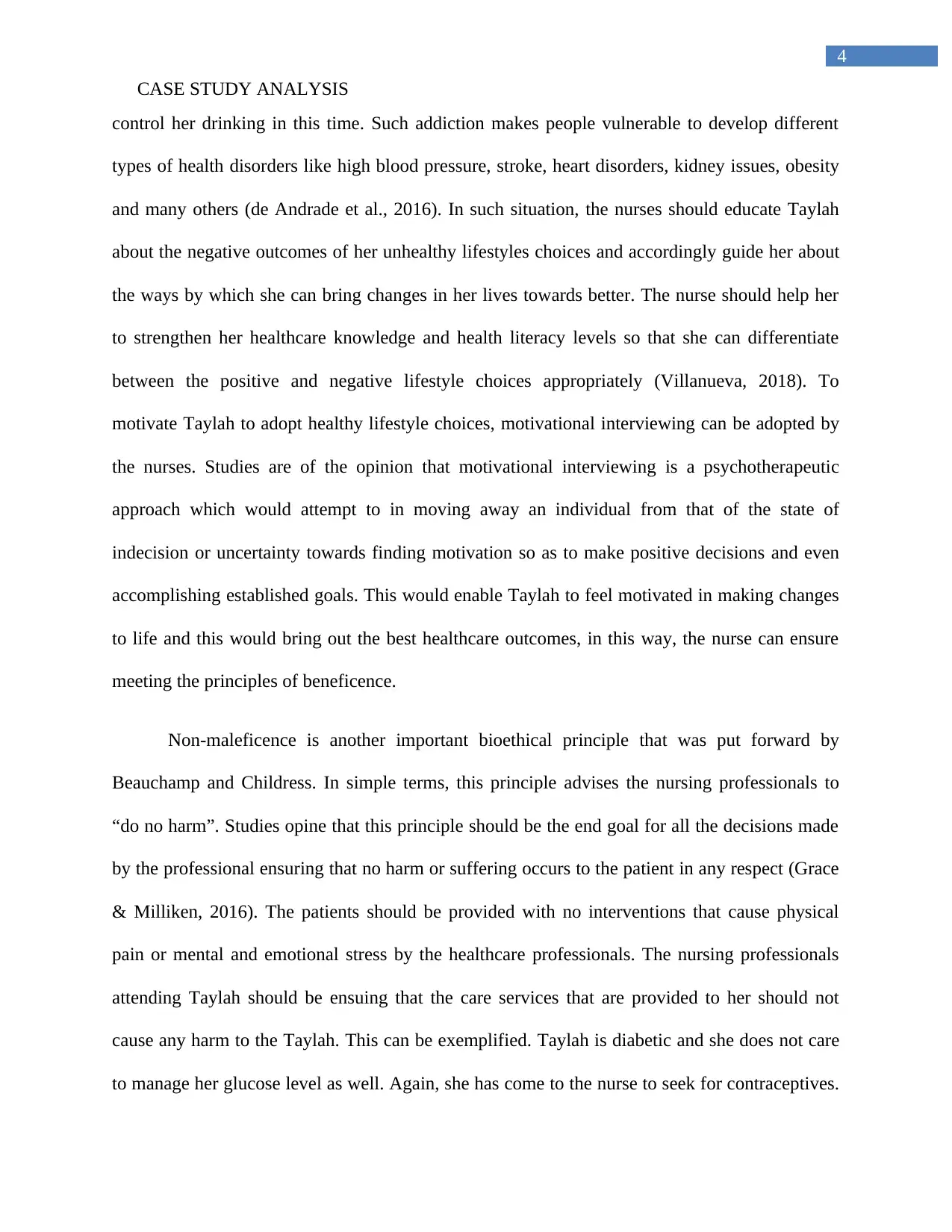
4
CASE STUDY ANALYSIS
control her drinking in this time. Such addiction makes people vulnerable to develop different
types of health disorders like high blood pressure, stroke, heart disorders, kidney issues, obesity
and many others (de Andrade et al., 2016). In such situation, the nurses should educate Taylah
about the negative outcomes of her unhealthy lifestyles choices and accordingly guide her about
the ways by which she can bring changes in her lives towards better. The nurse should help her
to strengthen her healthcare knowledge and health literacy levels so that she can differentiate
between the positive and negative lifestyle choices appropriately (Villanueva, 2018). To
motivate Taylah to adopt healthy lifestyle choices, motivational interviewing can be adopted by
the nurses. Studies are of the opinion that motivational interviewing is a psychotherapeutic
approach which would attempt to in moving away an individual from that of the state of
indecision or uncertainty towards finding motivation so as to make positive decisions and even
accomplishing established goals. This would enable Taylah to feel motivated in making changes
to life and this would bring out the best healthcare outcomes, in this way, the nurse can ensure
meeting the principles of beneficence.
Non-maleficence is another important bioethical principle that was put forward by
Beauchamp and Childress. In simple terms, this principle advises the nursing professionals to
“do no harm”. Studies opine that this principle should be the end goal for all the decisions made
by the professional ensuring that no harm or suffering occurs to the patient in any respect (Grace
& Milliken, 2016). The patients should be provided with no interventions that cause physical
pain or mental and emotional stress by the healthcare professionals. The nursing professionals
attending Taylah should be ensuing that the care services that are provided to her should not
cause any harm to the Taylah. This can be exemplified. Taylah is diabetic and she does not care
to manage her glucose level as well. Again, she has come to the nurse to seek for contraceptives.
CASE STUDY ANALYSIS
control her drinking in this time. Such addiction makes people vulnerable to develop different
types of health disorders like high blood pressure, stroke, heart disorders, kidney issues, obesity
and many others (de Andrade et al., 2016). In such situation, the nurses should educate Taylah
about the negative outcomes of her unhealthy lifestyles choices and accordingly guide her about
the ways by which she can bring changes in her lives towards better. The nurse should help her
to strengthen her healthcare knowledge and health literacy levels so that she can differentiate
between the positive and negative lifestyle choices appropriately (Villanueva, 2018). To
motivate Taylah to adopt healthy lifestyle choices, motivational interviewing can be adopted by
the nurses. Studies are of the opinion that motivational interviewing is a psychotherapeutic
approach which would attempt to in moving away an individual from that of the state of
indecision or uncertainty towards finding motivation so as to make positive decisions and even
accomplishing established goals. This would enable Taylah to feel motivated in making changes
to life and this would bring out the best healthcare outcomes, in this way, the nurse can ensure
meeting the principles of beneficence.
Non-maleficence is another important bioethical principle that was put forward by
Beauchamp and Childress. In simple terms, this principle advises the nursing professionals to
“do no harm”. Studies opine that this principle should be the end goal for all the decisions made
by the professional ensuring that no harm or suffering occurs to the patient in any respect (Grace
& Milliken, 2016). The patients should be provided with no interventions that cause physical
pain or mental and emotional stress by the healthcare professionals. The nursing professionals
attending Taylah should be ensuing that the care services that are provided to her should not
cause any harm to the Taylah. This can be exemplified. Taylah is diabetic and she does not care
to manage her glucose level as well. Again, she has come to the nurse to seek for contraceptives.
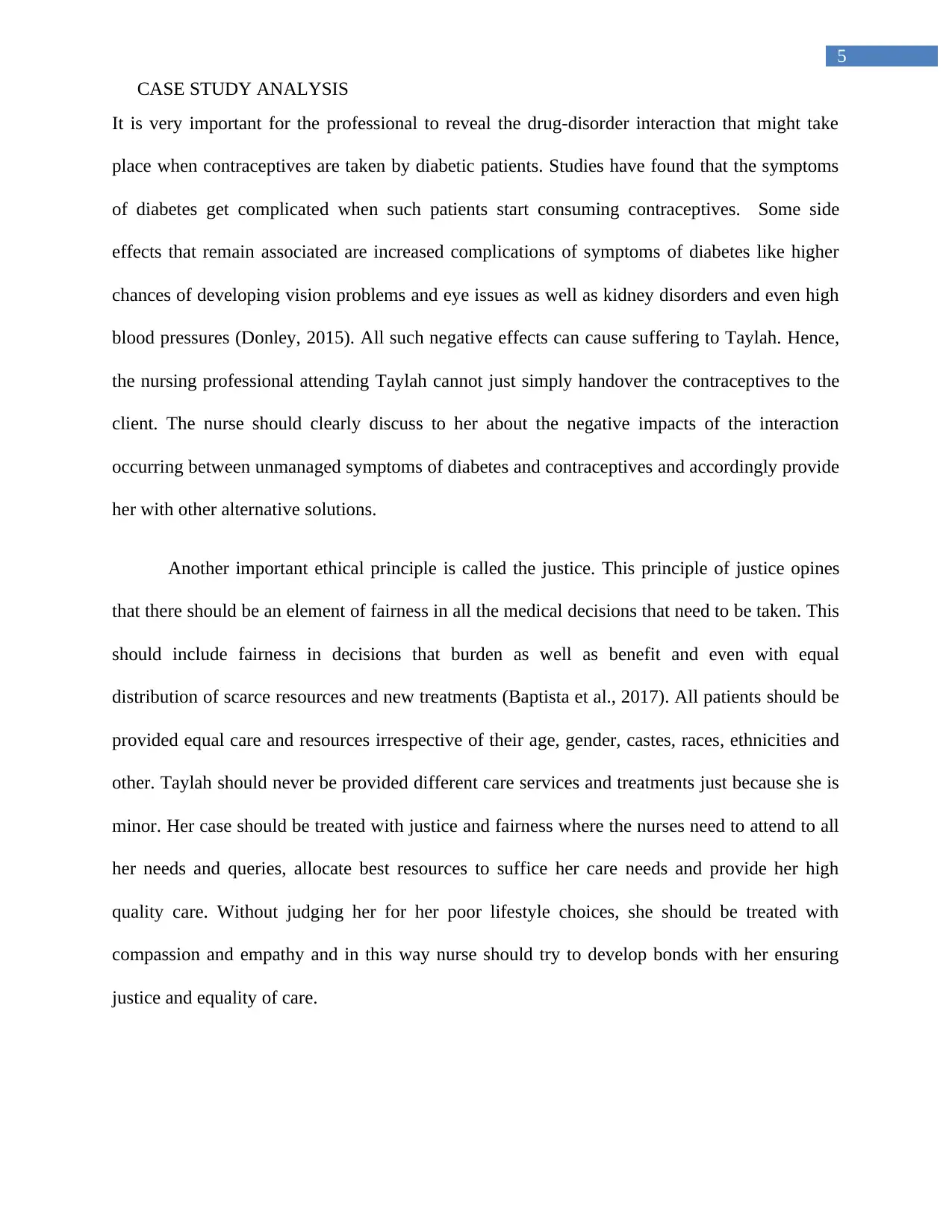
5
CASE STUDY ANALYSIS
It is very important for the professional to reveal the drug-disorder interaction that might take
place when contraceptives are taken by diabetic patients. Studies have found that the symptoms
of diabetes get complicated when such patients start consuming contraceptives. Some side
effects that remain associated are increased complications of symptoms of diabetes like higher
chances of developing vision problems and eye issues as well as kidney disorders and even high
blood pressures (Donley, 2015). All such negative effects can cause suffering to Taylah. Hence,
the nursing professional attending Taylah cannot just simply handover the contraceptives to the
client. The nurse should clearly discuss to her about the negative impacts of the interaction
occurring between unmanaged symptoms of diabetes and contraceptives and accordingly provide
her with other alternative solutions.
Another important ethical principle is called the justice. This principle of justice opines
that there should be an element of fairness in all the medical decisions that need to be taken. This
should include fairness in decisions that burden as well as benefit and even with equal
distribution of scarce resources and new treatments (Baptista et al., 2017). All patients should be
provided equal care and resources irrespective of their age, gender, castes, races, ethnicities and
other. Taylah should never be provided different care services and treatments just because she is
minor. Her case should be treated with justice and fairness where the nurses need to attend to all
her needs and queries, allocate best resources to suffice her care needs and provide her high
quality care. Without judging her for her poor lifestyle choices, she should be treated with
compassion and empathy and in this way nurse should try to develop bonds with her ensuring
justice and equality of care.
CASE STUDY ANALYSIS
It is very important for the professional to reveal the drug-disorder interaction that might take
place when contraceptives are taken by diabetic patients. Studies have found that the symptoms
of diabetes get complicated when such patients start consuming contraceptives. Some side
effects that remain associated are increased complications of symptoms of diabetes like higher
chances of developing vision problems and eye issues as well as kidney disorders and even high
blood pressures (Donley, 2015). All such negative effects can cause suffering to Taylah. Hence,
the nursing professional attending Taylah cannot just simply handover the contraceptives to the
client. The nurse should clearly discuss to her about the negative impacts of the interaction
occurring between unmanaged symptoms of diabetes and contraceptives and accordingly provide
her with other alternative solutions.
Another important ethical principle is called the justice. This principle of justice opines
that there should be an element of fairness in all the medical decisions that need to be taken. This
should include fairness in decisions that burden as well as benefit and even with equal
distribution of scarce resources and new treatments (Baptista et al., 2017). All patients should be
provided equal care and resources irrespective of their age, gender, castes, races, ethnicities and
other. Taylah should never be provided different care services and treatments just because she is
minor. Her case should be treated with justice and fairness where the nurses need to attend to all
her needs and queries, allocate best resources to suffice her care needs and provide her high
quality care. Without judging her for her poor lifestyle choices, she should be treated with
compassion and empathy and in this way nurse should try to develop bonds with her ensuring
justice and equality of care.
⊘ This is a preview!⊘
Do you want full access?
Subscribe today to unlock all pages.

Trusted by 1+ million students worldwide
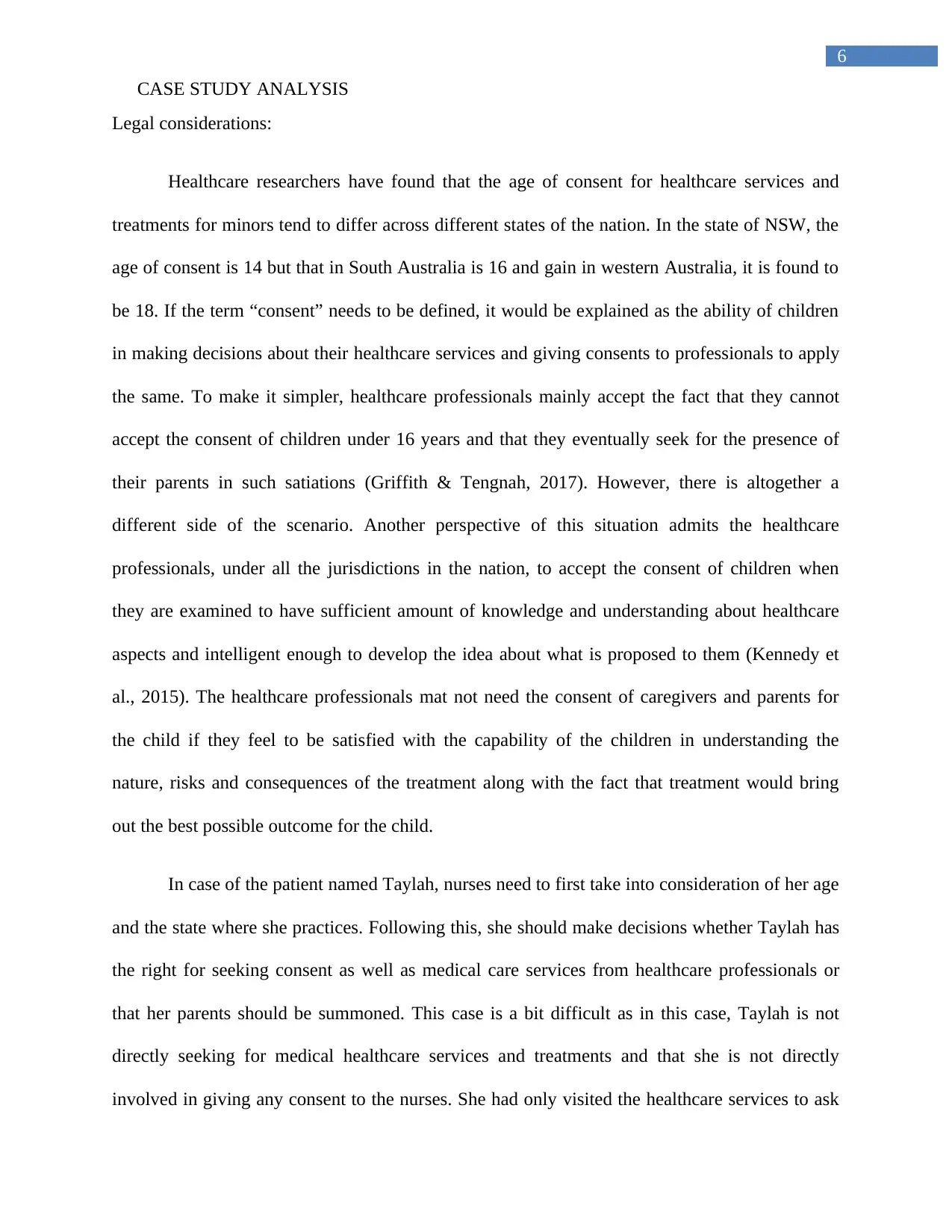
6
CASE STUDY ANALYSIS
Legal considerations:
Healthcare researchers have found that the age of consent for healthcare services and
treatments for minors tend to differ across different states of the nation. In the state of NSW, the
age of consent is 14 but that in South Australia is 16 and gain in western Australia, it is found to
be 18. If the term “consent” needs to be defined, it would be explained as the ability of children
in making decisions about their healthcare services and giving consents to professionals to apply
the same. To make it simpler, healthcare professionals mainly accept the fact that they cannot
accept the consent of children under 16 years and that they eventually seek for the presence of
their parents in such satiations (Griffith & Tengnah, 2017). However, there is altogether a
different side of the scenario. Another perspective of this situation admits the healthcare
professionals, under all the jurisdictions in the nation, to accept the consent of children when
they are examined to have sufficient amount of knowledge and understanding about healthcare
aspects and intelligent enough to develop the idea about what is proposed to them (Kennedy et
al., 2015). The healthcare professionals mat not need the consent of caregivers and parents for
the child if they feel to be satisfied with the capability of the children in understanding the
nature, risks and consequences of the treatment along with the fact that treatment would bring
out the best possible outcome for the child.
In case of the patient named Taylah, nurses need to first take into consideration of her age
and the state where she practices. Following this, she should make decisions whether Taylah has
the right for seeking consent as well as medical care services from healthcare professionals or
that her parents should be summoned. This case is a bit difficult as in this case, Taylah is not
directly seeking for medical healthcare services and treatments and that she is not directly
involved in giving any consent to the nurses. She had only visited the healthcare services to ask
CASE STUDY ANALYSIS
Legal considerations:
Healthcare researchers have found that the age of consent for healthcare services and
treatments for minors tend to differ across different states of the nation. In the state of NSW, the
age of consent is 14 but that in South Australia is 16 and gain in western Australia, it is found to
be 18. If the term “consent” needs to be defined, it would be explained as the ability of children
in making decisions about their healthcare services and giving consents to professionals to apply
the same. To make it simpler, healthcare professionals mainly accept the fact that they cannot
accept the consent of children under 16 years and that they eventually seek for the presence of
their parents in such satiations (Griffith & Tengnah, 2017). However, there is altogether a
different side of the scenario. Another perspective of this situation admits the healthcare
professionals, under all the jurisdictions in the nation, to accept the consent of children when
they are examined to have sufficient amount of knowledge and understanding about healthcare
aspects and intelligent enough to develop the idea about what is proposed to them (Kennedy et
al., 2015). The healthcare professionals mat not need the consent of caregivers and parents for
the child if they feel to be satisfied with the capability of the children in understanding the
nature, risks and consequences of the treatment along with the fact that treatment would bring
out the best possible outcome for the child.
In case of the patient named Taylah, nurses need to first take into consideration of her age
and the state where she practices. Following this, she should make decisions whether Taylah has
the right for seeking consent as well as medical care services from healthcare professionals or
that her parents should be summoned. This case is a bit difficult as in this case, Taylah is not
directly seeking for medical healthcare services and treatments and that she is not directly
involved in giving any consent to the nurses. She had only visited the healthcare services to ask
Paraphrase This Document
Need a fresh take? Get an instant paraphrase of this document with our AI Paraphraser
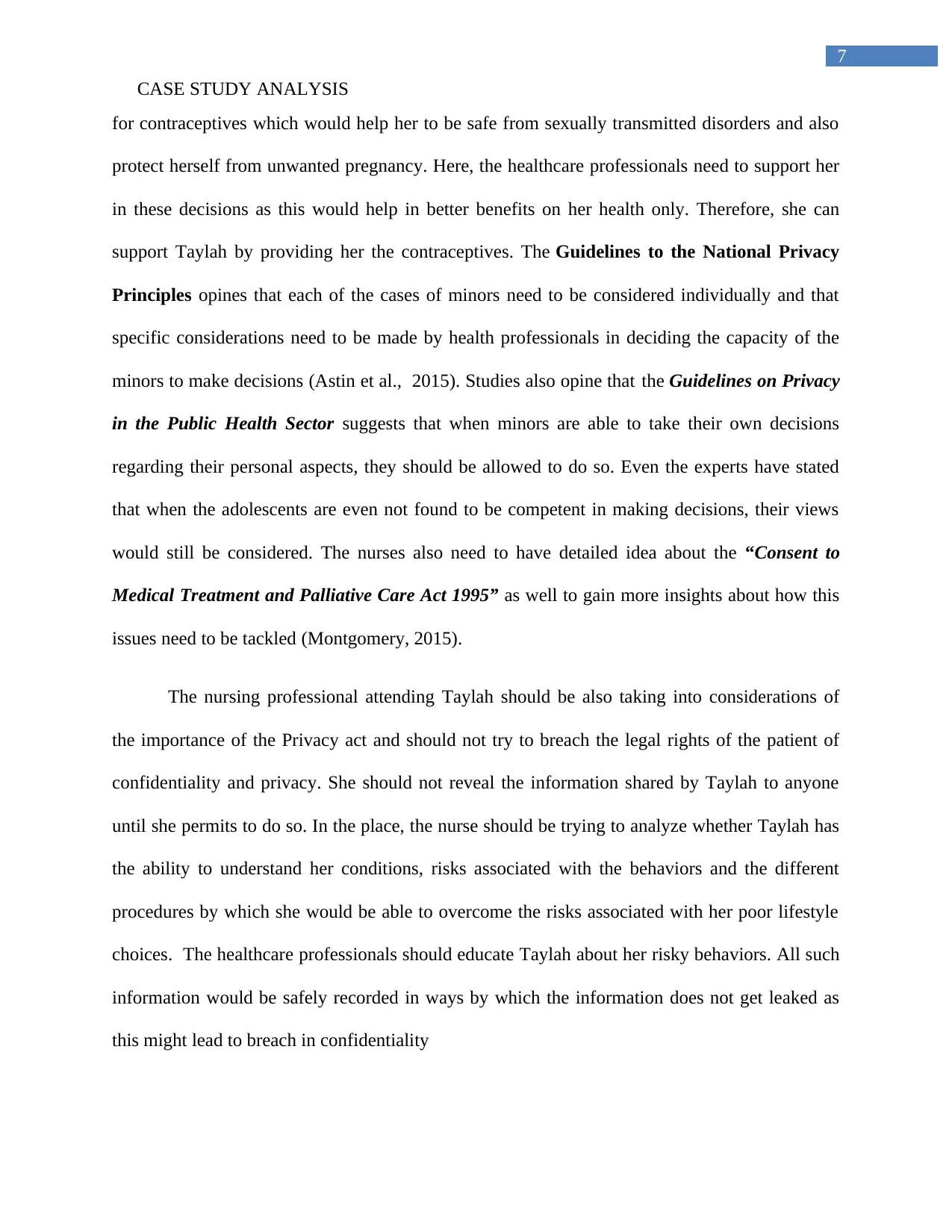
7
CASE STUDY ANALYSIS
for contraceptives which would help her to be safe from sexually transmitted disorders and also
protect herself from unwanted pregnancy. Here, the healthcare professionals need to support her
in these decisions as this would help in better benefits on her health only. Therefore, she can
support Taylah by providing her the contraceptives. The Guidelines to the National Privacy
Principles opines that each of the cases of minors need to be considered individually and that
specific considerations need to be made by health professionals in deciding the capacity of the
minors to make decisions (Astin et al., 2015). Studies also opine that the Guidelines on Privacy
in the Public Health Sector suggests that when minors are able to take their own decisions
regarding their personal aspects, they should be allowed to do so. Even the experts have stated
that when the adolescents are even not found to be competent in making decisions, their views
would still be considered. The nurses also need to have detailed idea about the “Consent to
Medical Treatment and Palliative Care Act 1995” as well to gain more insights about how this
issues need to be tackled (Montgomery, 2015).
The nursing professional attending Taylah should be also taking into considerations of
the importance of the Privacy act and should not try to breach the legal rights of the patient of
confidentiality and privacy. She should not reveal the information shared by Taylah to anyone
until she permits to do so. In the place, the nurse should be trying to analyze whether Taylah has
the ability to understand her conditions, risks associated with the behaviors and the different
procedures by which she would be able to overcome the risks associated with her poor lifestyle
choices. The healthcare professionals should educate Taylah about her risky behaviors. All such
information would be safely recorded in ways by which the information does not get leaked as
this might lead to breach in confidentiality
CASE STUDY ANALYSIS
for contraceptives which would help her to be safe from sexually transmitted disorders and also
protect herself from unwanted pregnancy. Here, the healthcare professionals need to support her
in these decisions as this would help in better benefits on her health only. Therefore, she can
support Taylah by providing her the contraceptives. The Guidelines to the National Privacy
Principles opines that each of the cases of minors need to be considered individually and that
specific considerations need to be made by health professionals in deciding the capacity of the
minors to make decisions (Astin et al., 2015). Studies also opine that the Guidelines on Privacy
in the Public Health Sector suggests that when minors are able to take their own decisions
regarding their personal aspects, they should be allowed to do so. Even the experts have stated
that when the adolescents are even not found to be competent in making decisions, their views
would still be considered. The nurses also need to have detailed idea about the “Consent to
Medical Treatment and Palliative Care Act 1995” as well to gain more insights about how this
issues need to be tackled (Montgomery, 2015).
The nursing professional attending Taylah should be also taking into considerations of
the importance of the Privacy act and should not try to breach the legal rights of the patient of
confidentiality and privacy. She should not reveal the information shared by Taylah to anyone
until she permits to do so. In the place, the nurse should be trying to analyze whether Taylah has
the ability to understand her conditions, risks associated with the behaviors and the different
procedures by which she would be able to overcome the risks associated with her poor lifestyle
choices. The healthcare professionals should educate Taylah about her risky behaviors. All such
information would be safely recorded in ways by which the information does not get leaked as
this might lead to breach in confidentiality
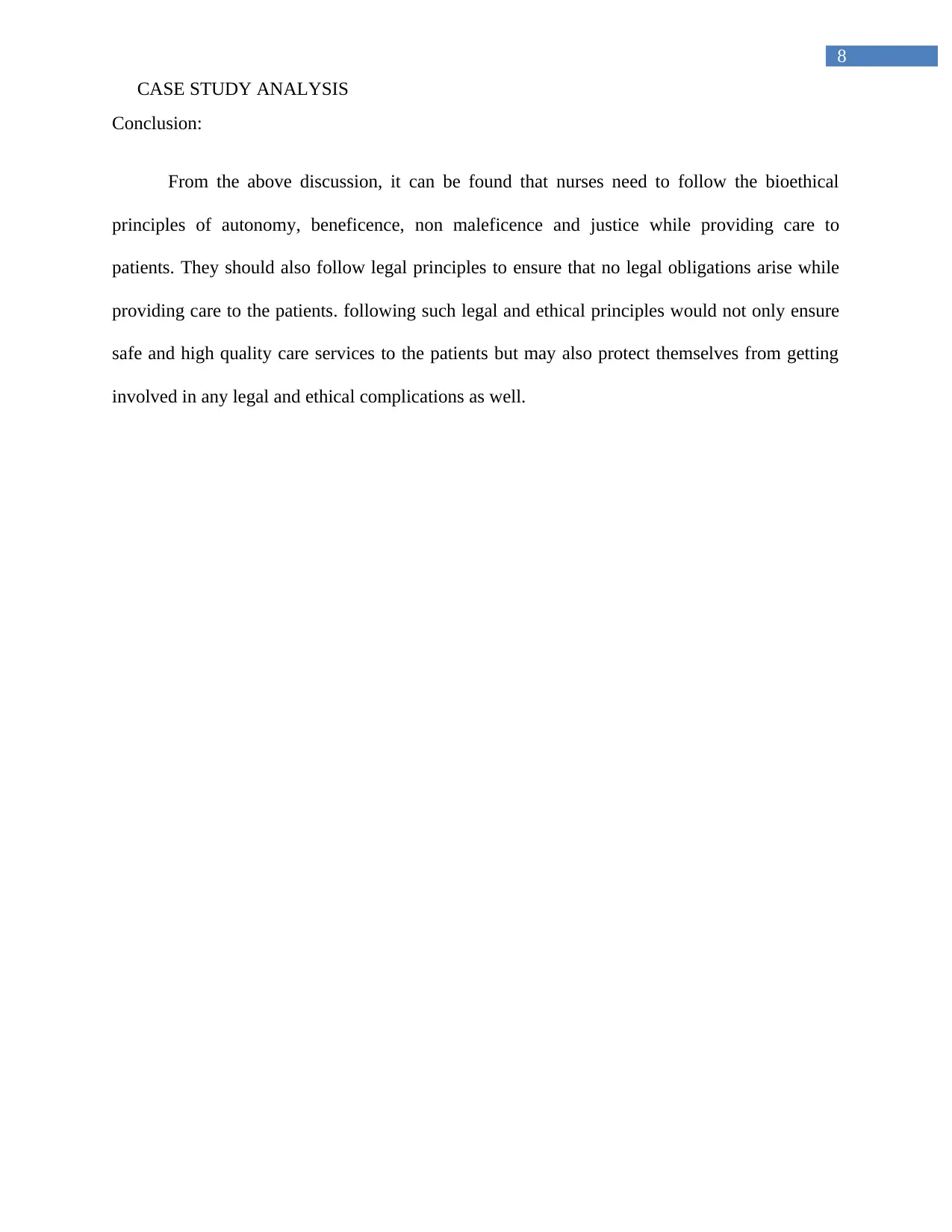
8
CASE STUDY ANALYSIS
Conclusion:
From the above discussion, it can be found that nurses need to follow the bioethical
principles of autonomy, beneficence, non maleficence and justice while providing care to
patients. They should also follow legal principles to ensure that no legal obligations arise while
providing care to the patients. following such legal and ethical principles would not only ensure
safe and high quality care services to the patients but may also protect themselves from getting
involved in any legal and ethical complications as well.
CASE STUDY ANALYSIS
Conclusion:
From the above discussion, it can be found that nurses need to follow the bioethical
principles of autonomy, beneficence, non maleficence and justice while providing care to
patients. They should also follow legal principles to ensure that no legal obligations arise while
providing care to the patients. following such legal and ethical principles would not only ensure
safe and high quality care services to the patients but may also protect themselves from getting
involved in any legal and ethical complications as well.
⊘ This is a preview!⊘
Do you want full access?
Subscribe today to unlock all pages.

Trusted by 1+ million students worldwide
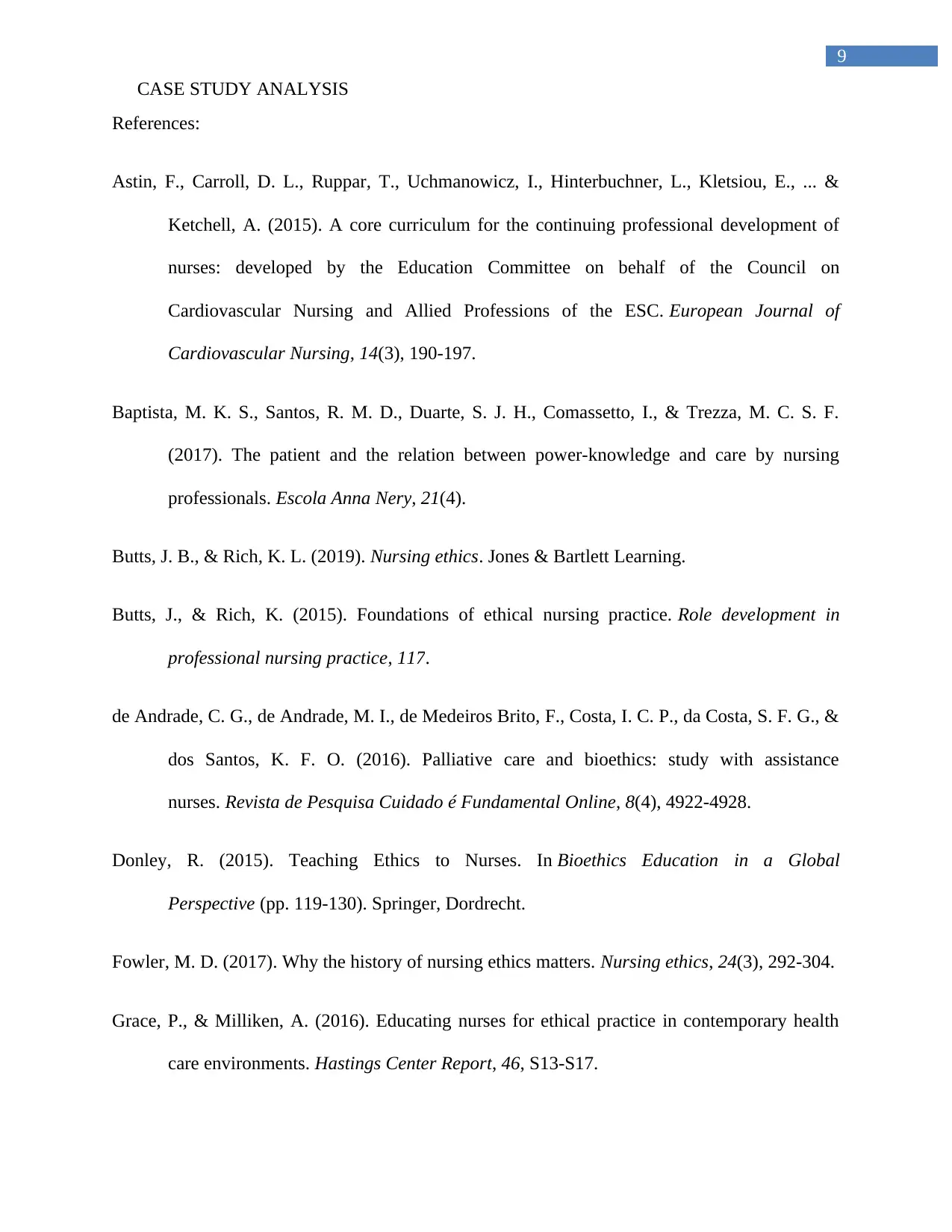
9
CASE STUDY ANALYSIS
References:
Astin, F., Carroll, D. L., Ruppar, T., Uchmanowicz, I., Hinterbuchner, L., Kletsiou, E., ... &
Ketchell, A. (2015). A core curriculum for the continuing professional development of
nurses: developed by the Education Committee on behalf of the Council on
Cardiovascular Nursing and Allied Professions of the ESC. European Journal of
Cardiovascular Nursing, 14(3), 190-197.
Baptista, M. K. S., Santos, R. M. D., Duarte, S. J. H., Comassetto, I., & Trezza, M. C. S. F.
(2017). The patient and the relation between power-knowledge and care by nursing
professionals. Escola Anna Nery, 21(4).
Butts, J. B., & Rich, K. L. (2019). Nursing ethics. Jones & Bartlett Learning.
Butts, J., & Rich, K. (2015). Foundations of ethical nursing practice. Role development in
professional nursing practice, 117.
de Andrade, C. G., de Andrade, M. I., de Medeiros Brito, F., Costa, I. C. P., da Costa, S. F. G., &
dos Santos, K. F. O. (2016). Palliative care and bioethics: study with assistance
nurses. Revista de Pesquisa Cuidado é Fundamental Online, 8(4), 4922-4928.
Donley, R. (2015). Teaching Ethics to Nurses. In Bioethics Education in a Global
Perspective (pp. 119-130). Springer, Dordrecht.
Fowler, M. D. (2017). Why the history of nursing ethics matters. Nursing ethics, 24(3), 292-304.
Grace, P., & Milliken, A. (2016). Educating nurses for ethical practice in contemporary health
care environments. Hastings Center Report, 46, S13-S17.
CASE STUDY ANALYSIS
References:
Astin, F., Carroll, D. L., Ruppar, T., Uchmanowicz, I., Hinterbuchner, L., Kletsiou, E., ... &
Ketchell, A. (2015). A core curriculum for the continuing professional development of
nurses: developed by the Education Committee on behalf of the Council on
Cardiovascular Nursing and Allied Professions of the ESC. European Journal of
Cardiovascular Nursing, 14(3), 190-197.
Baptista, M. K. S., Santos, R. M. D., Duarte, S. J. H., Comassetto, I., & Trezza, M. C. S. F.
(2017). The patient and the relation between power-knowledge and care by nursing
professionals. Escola Anna Nery, 21(4).
Butts, J. B., & Rich, K. L. (2019). Nursing ethics. Jones & Bartlett Learning.
Butts, J., & Rich, K. (2015). Foundations of ethical nursing practice. Role development in
professional nursing practice, 117.
de Andrade, C. G., de Andrade, M. I., de Medeiros Brito, F., Costa, I. C. P., da Costa, S. F. G., &
dos Santos, K. F. O. (2016). Palliative care and bioethics: study with assistance
nurses. Revista de Pesquisa Cuidado é Fundamental Online, 8(4), 4922-4928.
Donley, R. (2015). Teaching Ethics to Nurses. In Bioethics Education in a Global
Perspective (pp. 119-130). Springer, Dordrecht.
Fowler, M. D. (2017). Why the history of nursing ethics matters. Nursing ethics, 24(3), 292-304.
Grace, P., & Milliken, A. (2016). Educating nurses for ethical practice in contemporary health
care environments. Hastings Center Report, 46, S13-S17.
Paraphrase This Document
Need a fresh take? Get an instant paraphrase of this document with our AI Paraphraser
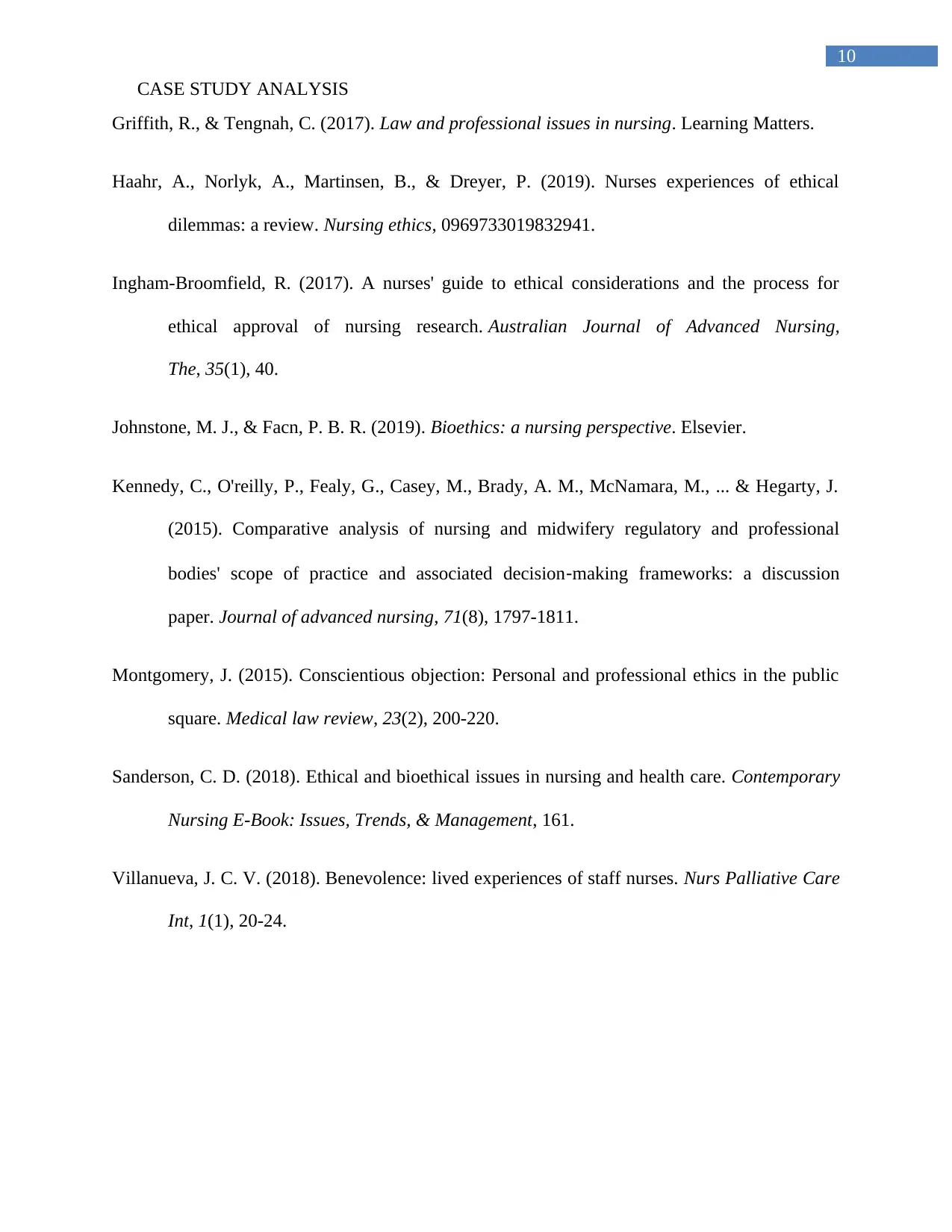
10
CASE STUDY ANALYSIS
Griffith, R., & Tengnah, C. (2017). Law and professional issues in nursing. Learning Matters.
Haahr, A., Norlyk, A., Martinsen, B., & Dreyer, P. (2019). Nurses experiences of ethical
dilemmas: a review. Nursing ethics, 0969733019832941.
Ingham-Broomfield, R. (2017). A nurses' guide to ethical considerations and the process for
ethical approval of nursing research. Australian Journal of Advanced Nursing,
The, 35(1), 40.
Johnstone, M. J., & Facn, P. B. R. (2019). Bioethics: a nursing perspective. Elsevier.
Kennedy, C., O'reilly, P., Fealy, G., Casey, M., Brady, A. M., McNamara, M., ... & Hegarty, J.
(2015). Comparative analysis of nursing and midwifery regulatory and professional
bodies' scope of practice and associated decision‐making frameworks: a discussion
paper. Journal of advanced nursing, 71(8), 1797-1811.
Montgomery, J. (2015). Conscientious objection: Personal and professional ethics in the public
square. Medical law review, 23(2), 200-220.
Sanderson, C. D. (2018). Ethical and bioethical issues in nursing and health care. Contemporary
Nursing E-Book: Issues, Trends, & Management, 161.
Villanueva, J. C. V. (2018). Benevolence: lived experiences of staff nurses. Nurs Palliative Care
Int, 1(1), 20-24.
CASE STUDY ANALYSIS
Griffith, R., & Tengnah, C. (2017). Law and professional issues in nursing. Learning Matters.
Haahr, A., Norlyk, A., Martinsen, B., & Dreyer, P. (2019). Nurses experiences of ethical
dilemmas: a review. Nursing ethics, 0969733019832941.
Ingham-Broomfield, R. (2017). A nurses' guide to ethical considerations and the process for
ethical approval of nursing research. Australian Journal of Advanced Nursing,
The, 35(1), 40.
Johnstone, M. J., & Facn, P. B. R. (2019). Bioethics: a nursing perspective. Elsevier.
Kennedy, C., O'reilly, P., Fealy, G., Casey, M., Brady, A. M., McNamara, M., ... & Hegarty, J.
(2015). Comparative analysis of nursing and midwifery regulatory and professional
bodies' scope of practice and associated decision‐making frameworks: a discussion
paper. Journal of advanced nursing, 71(8), 1797-1811.
Montgomery, J. (2015). Conscientious objection: Personal and professional ethics in the public
square. Medical law review, 23(2), 200-220.
Sanderson, C. D. (2018). Ethical and bioethical issues in nursing and health care. Contemporary
Nursing E-Book: Issues, Trends, & Management, 161.
Villanueva, J. C. V. (2018). Benevolence: lived experiences of staff nurses. Nurs Palliative Care
Int, 1(1), 20-24.
1 out of 11
Related Documents
Your All-in-One AI-Powered Toolkit for Academic Success.
+13062052269
info@desklib.com
Available 24*7 on WhatsApp / Email
![[object Object]](/_next/static/media/star-bottom.7253800d.svg)
Unlock your academic potential
Copyright © 2020–2026 A2Z Services. All Rights Reserved. Developed and managed by ZUCOL.




